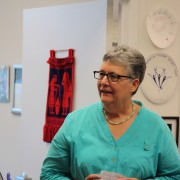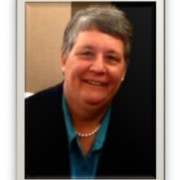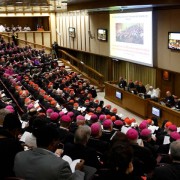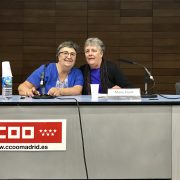Mary E. Hunt: Celebrating the Accomplishments of the Women’s Ordination Movement
“Catholic Women’s Ordination: Forty Years of Success and Challenges to Come”
Gospel, Gender, Global Justice Conference WOC/WOW
Mary E. Hunt, September 18, 2015
Mary E. Hunt gave the opening speech at the 2015 Women’s Ordination Worldwide meeting in Philadelphia, calling the audience to celebrate the ways in which the women’s ordination movement of the past forty years has been successful.
Highlights and full text below.
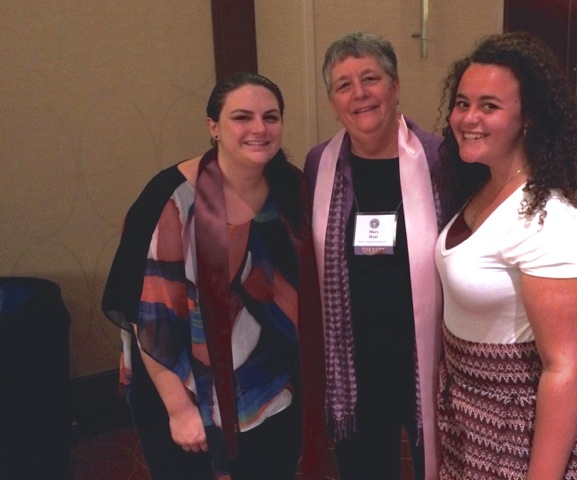
WATER colleagues Cathy Jaskey, Mary E. Hunt, and Jacqueline Small enjoying the meeting of the Women’s Ordination Conference & Women’s Ordination Worldwide in Philadelphia, 9/20/15
Ten Accomplishments to Celebrate:
We have successfully avoided being coopted by kyriarchal Catholicism.
We have shaped, thanks to feminist and other liberation theologies, the changing field of theology, from a clerical, ecclesial science to a lay and communal art.
We refuse, as women, to be divided and conquered into nuns and laywomen.
We name and claim many role models as part of our movements for justice and liberation.
We connect with each other through the deeply interreligious nature of our struggle.
We engage in feminist ministry in myriad forms.
We are instrumental in creating new models of church.
We rejoice in the international nature of our movement.
We create rich spirituality and liturgy that characterize our movement and are a resource for the whole church.
We are just getting started.
[full text]
Good morning. Thanks to WOC and WOW organizers for bringing us together. Thanks to Dr. Shannen Dee Williams for her welcome and insightful presentation. Indeed the movement for the ordination of women and other forms of feminist ministry has been part of a racist church in a racist culture. While WOC instituted an anti-racist program ten years ago, we have only begun to do the work needed to move beyond the unjust past we share.
I bring into our midst the late Ada Maria Isasi-Diaz, one of the first women of color to point out the shortcomings and structural problems of the women’s ordination movement. Ada spared no one and nothing in her analysis. But she also hung in until the end of her all-too-short life teaching, writing, and ministering as a Catholic mujerista. Ada Maria Isasi-Diaz, Presente.
Shannen has talked about the racist structures of church and society and especially about the lives of Black Sisters—“Black Sisters Lives Matter.” Dr. Elisabeth Schüssler Fiorenza, who has been in this struggle since before WOC’s beginning, will discuss feminist theology, papal theology of women, and the ekklesia of women.
My focus is on the accomplishments that we are here to celebrate this weekend and the challenges ahead. In forty years, it is my view that we have made real progress and real change despite the kyriarchal church’s continued recalcitrance. Let us celebrate the integrity, hard work, and creative ministry of so many women and men whose visions of an inclusive, justice-seeking church are being lived out now and are shaping future forms of church and society.
Tom Fox in his current National Catholic Reporter piece about the Women’s Ordination Conference and this meeting described Elisabeth and me as “veteran Catholic feminists.” I laughed and was reminded of a recent conversation I had with my friend, Sue Fulton, a military vet, who graduated from West Point in 1980 in the first class that included women. She now chairs West Point’s Board of Visitors (like the board of directors). Sue was boasting the importance of women finally completing Army Ranger training. For my friend and her West Point women, this is a source of enormous pride. Come January, a government decision will be made as to whether women now finally can be in ground combat, the real thing in the Army. Sue and her pioneer colleagues had been prevented from combat despite their West Point rings. Women rangers prove that there should be no such barrier for those who are qualified. Sound familiar?
She knows that I do not approve of war at all, and infantry is not my cup of tea. But she also knows that I rejoice in women’s accomplishments, in the Army women’s case, breaking the brass ceiling. So she teased me saying, “Forty years later, look at what we have accomplished and look where you folks are on ordination.”
At first blush, she makes a point. Two Army women now wear the Ranger tab, but Catholic women are not validly and licitly ordained according to the institutional Roman Catholic Church. But on reflection, it is clear that we have had an enormous, historic, positive impact on both church and world by successfully avoiding being coopted by a kyriarchal structure that long predates the U.S. Army and claims not patriotic, but divine obedience. I assured her that our accomplishments were just as momentous and perhaps even more useful. We are living out what we envision, not joining a system in which men who would exclude us now tell us what to do. I advised her that it would be well for Army women to transform their system into a peace movement. Sue and I will keep on talking in the meantime.
In that spirit, and in a contemporary fashion favored by trendy people, let me lay out the top ten accomplishments of our movement; you can add more in our discussion. I offer the list not in a fit of pride—we’ve made our share of mistakes big and small—but in a spirit of frank and candid assessment so that we can build on our strengths. Victors not vanquished write history. We have every right and obligation to tell the story as we see it. After all, if you Google “Catholic women’s ordination” or you consult Wikipedia, you will not necessarily find this version because the usual measure—whether women are validly and licitly ordained– is wrong.
The point is not whether women have successfully become what men tell us we cannot be due to our nature/anatomy and their limited understanding of our shared tradition. Rather, the task at hand is to see how the marginalization of women by men, whether in priesthood or elsewhere, reinforces structures of inequality and injustice of many sorts that have shaped power throughout the world. If women can be excluded from decision making and ministry in the Roman Catholic Church, then it is implicitly ok to treat girl students differently than boys, to pay women less than men, to use and abuse women’s bodies, to control women’s reproductive choices, to ignore the plight of immigrant women, those with HIV/AIDS and their dependent children, even to pillage Earth and abuse animals because some people, namely, men, are more equal than others with the power to make their ways stick. Those justice connections, and not simply (and not excluding) women as priests, are what are at stake.
For Catholic feminists, the job is not to get a few women into kyriarchal structures in the feeble hope of changing them from within. Rather, it is to envision and construct new models and new movements (some may be churches) in which people of good will cooperate to eliminate injustice and live harmoniously on a healthy Earth. Eradicating gender exclusion is a Gospel mandate that will enhance global justice, hence our conference theme. That is how women’s ordination connects with the urgent needs of a world where multiple wars rage, millions are on the move to save their lives, and a tiny group of people control most of the resources. To cast our work more narrowly, especially in terms of simply getting Catholic women ordained, would be to miss our human vocation as global change agents.
Of course, I am not a disinterested observer. I attended the landmark WOC gathering in Detroit on Thanksgiving weekend 1975 as a very young doctoral student. I spoke in 1978, at the Baltimore WOC conference when I laid out the “patriarchal past and the feminist future” of women’s ordination, and at the WOW conference in Ottawa in 2005 where I talked about feminist ministry. I have been a grateful member and advisor to WOC for decades, attending meetings, writing, and collaborating through the Women’s Alliance for Theology, Ethics, and Ritual (WATER), which is part of the Women-Church Convergence. So my perspective on our accomplishments includes a critical assessment of my own work. I offer it not as a coda to a movement, but more like a midpoint assessment.
So I turn to my Top Ten list of what Women’s Ordination Conference, WOW friends, and all who seek to do justice can celebrate. I list them in no particular order because they are all important.
We have successfully avoided being coopted by kyriarchal Catholicism. In the 1999/3 issue of CONCILIUM, editors Elisabeth Schüssler Fiorenza and Hermann Haring, used the title “The Non-Ordination of Women and the Politics of Power” (http://www.bijbel.net/concilium/?b=25795) They wrote in their insightful introduction: “… the focus of this issue of Concilium is not the question of the ordination of wo/men but rather the non-ordination of wo/men and its impact on the self understanding and practice of church. We are not interested so much in taking up once again the arguments for and against the ordination of wo/men as though wo/men were the problem. Rather we seek to explore the politics of power that has led to the most recent authoritarian assertions of Rome….The issue at hand is no longer a ‘woman’s problem’, the question goes to the very heart and integrity of church and theology.” (http://www.bijbel.net/concilium/?b=26002 p.1)
This framing of the question has served us very well for the last twenty years. We have moved away from questioning or even responding to queries about women’s ability to minister, the rightness of women’s involvement in decision-making, female symbols and images of divine power. We have gone about our ministries, rejecting the institutional church’s distorted notions of women, and proving over and over that women can and are effective ministers.
We have found the institutional church wanting on most counts. Despite a charismatic pope at the moment to whom I will return shortly, the institution is fraught with corruption both moral and economic, replete with scandal both on sexual and spiritual fronts beginning with clergy sexual abuse and episcopal cover-up, and losing members by the millions who flee from its hypocrisy and deserve better. So we can rejoice that not one of us has been ordained into that disgraceful institution. If forty years after WOC raised women’s ordination to international attention, indeed more than 100 years since St. Joan’s Alliance, Mary B. Lynch and company first explored this religious territory, the Vatican is still calling women “special” because we can be mothers, I think our success at avoiding their company is devoutly to be affirmed!
Our second success is that thanks to feminist and other liberation theologies, the field of theology has changed from a clerical, ecclesial science to a lay and communal art. The practitioners have changed. Think of the theologians you listen to or study. Few of them are ordained and working for the church any more. This is a new phenomenon in church history.
Contemporary Catholic scholars are people like Elisabeth Schüssler Fiorenza, Ivone Gebara, Rosemary Radford Ruether, Shawn Copeland, Margaret Farley, Maria Pilar Aquino, none of whom are ordained. This is only to mention the most experienced colleagues. Happily many new scholars are also on the horizon. Rare are the clerics we read—Charles Curran and Thomas Gumbleton being notable exceptions.
Theology has changed because of the changes in who does it. With the help of scholars, now whole communities do theology. Some religious orders, as well as Intentional Eucharistic Communities, Dignity chapters, women-church groups among others are engaged in theologizing about their charisms, their commitments, their understandings of sacraments, their ethical priorities, and more. Contrast the wide-open tables of these groups with the constricted agenda and truncated guest list of the upcoming World Meeting of Families. Let us give thanks to Sophia in her Wisdom for the new theological richness that our movement has helped to spawn.
Our third success is the refusal of women to be divided and conquered into nuns and laywomen. If we have learned anything from the non-ordination of women, it is that all women are laywomen despite energetic efforts on the part of the Vatican to suggest otherwise.
Women in religious congregations choose community as the setting for their mission and ministry. But it is ordination in kyriarchy, not membership in a religious community, which divides clergy and laypeople. Thus women religious have no special status, special privilege, nor special responsibility among us, despite the Vatican’s rhetoric. To the contrary, we learned through the Apostolic Visitation of women’s religious congregations and the Doctrinal Assessment of the Leadership Conference of Women Religious the truth of the bumper sticker “We are all nuns.” Affronts to the dignity and integrity of women religious are affronts to all of us.
The same strong-arm tactics that Vatican officials attempted, however unsuccessfully, against women religious are used on a regular basis to insult and impugn the moral integrity of all women who choose to use birth control or have abortions, lesbian women who choose to love other women sexually, and myriad other instances of ecclesial transgressions against women, including the ban on women from priestly ordination that keeps women from having the jurisdiction or decision making power that comes with it. We see these tactics for what they are and reject them wholesale.
Let us rejoice together this weekend that our solidarity as committed religious women from a wide range of starting points is our strength. And if we have made strides on this church-caused laywoman/nunwoman divide, imagine how much more we can and must do together to overcome injustices of race, economics, age, ability and the like.
Let us not leave aside our fourth success, namely the myriad role models we have named and claimed as part of our movements for justice and liberation. Jewish feminist scholar Judith Plaskow gave us Lilith as a counterpoint to Eve. The late biblical scholar Jane Schaberg snatched Mary Magdalene from the jaws of patriarchy and helped us to see her centrality in the Jesus narrative. We now cherish Brigit of Ireland, Hildegard of Bingen and Theresa of Avila, Clare and Mechtild who were previously obscured from us under the dust of patriarchy. They function as prototypes of our own work—our musicians writing new songs, our scholars excavating and innovating the intellectual landscape, our spiritual leaders sharing their insights. Without concrete persons as role models it is hard to imagine our way forward.
In our own day, the four U.S. women killed December 2, 1980 in El Salvador–Maura Clark, Dorothy Kazel, Ita Ford, Jean Donovan—sobered us into realizing just how much our commitments can cost. We have Theresa Kane with us this weekend—an icon of women’s bold, courageous, and courteous efforts to bring about right relation. A quick look around this room reveals many more role models, people doing the everyday work of justice and liberation, of gospel and global justice because of gender empowerment. Let us celebrate that!
Our fifth major accomplishment is the deeply interreligious nature of our struggle. This will be on display tomorrow night when Maureen Fiedler chairs the panel of women representing a range of religious traditions. Like her regular and marvelous radio show, “Interfaith Voices,” we will celebrate the connections between/among our movements. For decades, Catholic women have joined hands, hearts, and checkbooks with women from many traditions, both being inspired by and inspiring them in their struggles. For example, Episcopal women ordained as priests in Philadelphia in 1974 were an immediate spark for the first WOC conference. Mormon women seeking ordination in their church today are close colleagues. There are so many others, especially our local colleagues for whom we are grateful and with whom we have so much more in common than with many local ordained Catholic male priests.
We have learned from ordained women—rabbis, Protestant minsters, Muslim colleagues, and others—the privileges and pitfalls of ordination. And we have seen in their processes many elements of our own. Moreover, we have found in their feminist/womanist/mujerista theological work, liturgical creation, and scriptural analysis many insights that now shape our own religious and spiritual lives. What we mean by Catholic has changed thanks to them, now reflecting more the original sense of broadly based. It is with gratitude that we celebrate the interfaith dimensions of our struggle.
Our sixth success is feminist ministry in myriad forms. Feminist ministry is the umbrella term used to describe the many ways in which we meet the needs of the world. This includes ministries of education, health care, political life, social work, as well as leading worship, preaching, and administering our base communities. What are new and worthy of celebration are the many ways in which Catholic women carry out these tasks with dignity, integrity, competence, and little or no support from the kyriarchal church.
Contrast this with the least interest a young man shows in ministry and the support he receives from first inkling to priestly ordination. The economic injustice alone remains remarkable. Catholic women still pay for Master of Divinity degrees to prepare themselves for ministry jobs that they will never get in their own tradition. Women who work in parishes and schools labor for low salaries, unjust working conditions, and the indignity of having to sign morality clauses declaring their fidelity to ‘male made’ doctrines. This is a disgrace, a waste of human resources since women are often the best person for the job.
We now have Catholic women priests ordained in a variety of ways. Catholic women ordained as Lutheran or Episcopal priests, as United Church of Christ, Methodist, Disciples, or other Christian denomination ministers, are, after all, also Catholic ministers. Women ordained through Roman Catholic Womenpriests and the Association of Roman Catholic Women Priests, and the Ecumenical Catholic Communion, and other groups now claim and demonstrate that we have Catholic women priests. I note that the sun has always come up the next day, that the world has not come crashing to a halt, and gravity still pulls despite these ordinations. To the contrary. For some people, seeing women ministers, indeed women priests, in action, especially but not only in sacramental ministry, is a catalyst for moving beyond kyriarchy. Witness: Stephen Colbert and his late but lasting insight into the symbolic importance of women presiding at a Eucharist. With a woman priest he saw something about himself, his body in the Eucharist. How fortunate for him, finally.
Feminist ministers, including priests, prove three important points: first, that feminist ministry takes many forms for which local communities are finally responsible; second, that the needs of the world not the failings of the church determine how feminist ministers act because the urgency of injustice permits none of us to stand by idly while people are in need; and third, that the validity and licitness of sacraments are in the eyes of the beholder such that theological hairsplitting takes a backseat to pastoral practice.
Let all who engage in feminist ministry that does justice celebrate the variety of paths we have chosen including those who are priests, the many means we have implemented, and the range of efforts that it takes to redirect the resources of a kyriarchal institution. Of course we do not all agree on preferred strategies, but I consider it a mark of our maturity as a movement that we are all in the same room this weekend, respecting one another and looking forward together. Celebrate that!
In the seventh place, we have been instrumental in creating new models of church. When WOC began, the notion of “renewed priestly ministry in a renewed church” began with it. I daresay we were in the vanguard, and remain so in creating new ways to be church. Many people have left the institutional church because of the scandal of gender inclusion (not to mention issues of abuse, sexuality, divorce, remarriage etc.). We did not invent these problems, but our solutions have become models for other people.
The women-movement, based on the ekklesia of women, which Elisabeth will discuss, is a wonderful example. Women-church groups function largely without benefit of clergy and with inclusive participation of all members. Intentional Eucharistic Communities are equally diverse in their makeup, providing real and ready alternatives to parishes that no longer fulfill the faith needs of many Catholics and can be staffed or closed at the will of the kyriarchy not in conversation with the congregants.
Let us celebrate all of these new models of church. More will emerge as we go forward. Let us note that we have made the non-ordination of women a catalyst for wholesale church change.
Our eighth success is the international nature of our movement. Women’s Ordination Worldwide is living proof that what began as a movement in one setting has morphed into a range of movements in many settings. These autonomous but interconnected groups demonstrate that feminist ministry is not a U.S.-only phenomenon, nor is it a U.S. export. Each local group has its own character and content, its own priorities and methods. There are other church change groups that do not belong to WOW but are working for similar goals. These include LGBTIQ groups, reproductive justice coalitions, married priests, and the like. We celebrate in many languages and styles, with many songs and dances our successes at being church and fulfilling social justice needs around the world despite great odds. Alleluia.
Our ninth success worthy of celebration is the rich spirituality and liturgy that characterize our movement and are a resource for the whole church. I am fortunate to live and work with one of the prime movers in this regard, Diann Neu, so I know firsthand the creativity and energy that goes into planning and offering prayers and rituals that convey our deepest commitments. By contrast, learning the rubrics of the Mass and how to preach an eight-minute sermon is child’s play. Our liturgists, musicians, dancers, preachers bring incredible talent and training, creativity and insight to their work. They rely not just on the first and second readings as prescribed in the lectionary, but on materials from literature and the arts, new interpretations of scripture, fresh perspectives on traditional celebrations. They invite us to contemplation and they accompany us in our most liminal moments. There is no reason to tolerate rote masses and rank awful sermons.
Creative spirituality and liturgy are normative in our circles. Liturgical and spiritual innovators will help us celebrate this weekend, and we celebrate them as well.
Our tenth success is that we are just getting started. For those who came to Philadelphia to celebrate the end of WOC or the demise of Catholic women’s movements, let me suggest respectfully that you are in the wrong place. If you want to see a movement in decline you might want to come back next week and see the holy hoopla of the papal tsunami that will disrupt this city’s citizens, cost money that, in my view, could be better spent on direct service to the poor and structural change efforts to end poverty. But we are just getting started! Here’s why.
We make the explicit claim that the exclusion of women from decision-making and ministry in the Roman Catholic Church is a symptom and at the same time a byproduct of a theology and ecclesial polity of inequality and elitism. As such, it baptizes and confirms other such forms of oppression—whether racism, economic injustice, heterosexism, ableism, colonialism, militarism, and the like. Our many and varied efforts to change the kyriarchal system are based in Gospel values of love and justice and aimed at the broadest possible global justice agenda. We have work to do. Let us celebrate the first forty years with a commitment to move ahead according to our lights, confident of our foundations.
All of these successes have their shadow sides as well which we can discuss after Elisabeth’s presentation. But let us take the time to celebrate the good things we have done in order to fortify ourselves for ongoing work.
Let me conclude with what I consider to be a major challenge ahead. I predict that as Francis’ papacy unfolds there will be some effort to coopt women in ministry. Look at the jesuitical solutions we have seen of late on three other issues and expect to see something similar soon on ordination even though Francis said, “that door is closed.”
- On abortion—the recent announcement that during the Year of Mercy (not before and maybe not after) women who have had abortions may confess their “sin” to any priests, not only to a bishop, and ask forgiveness. To the unsuspecting, this is perceived as a tiny step in the right direction. In my view, it is simply making it easier for women to do what the kyriarchy wants, namely, to think of abortion as sin, which many do not. It also gives even more men authority over women. I see no real step forward here.
- A similar dynamic is obvious in the recent Motu Proprio regarding annulments. While conservatives in the Curia are wringing their hands, it seems clear that Francis has succeeded in reinforcing the status quo, i.e., divorce and remarriage are unacceptable on the face, but permitted, perhaps made a tad easier, quicker, and cheaper, under the church’s new rules. There is no change in teaching, only a certain facilitating of the process to invite more compliance. Is this really a step forward? I doubt it.
- The pattern repeats on LGBTIQ questions at the World Meeting on Families. Despite the plenitude of queer Catholics, the only openly same-sex loving person on the agenda is a celibate gay man who will speak along with his mother. No one can say LGBTIQ people were left out, and no one can say that anyone who disagrees with the kyriarchy’s position is being given air space. While some may consider this another baby step in the right direction, I suggest that it is, like the other two examples, a case of having it both ways and strengthening the status quo. No wonder the kyriarchal church has endured for 2000 years!
These moves are unacceptable to all but those who labor under extremely low expectations of themselves and their religious community. I urge us to educate the media to understand the complexity of such moves rather than reflexively reporting that things are changing when in fact they are not, at least for women.
Project this approach onto the matter of women’s ministry. I can imagine a celibate, clerical, hierarchical (albeit below or really next to the lowest rung) deaconess offer sometime in the relatively near future. It will be tempting for some women to accept it as all they can expect from kyriarchy in their lifetime, a foot in the door as it were. They may be right, and my expectations are even lower. But that is why I sincerely hope that all we celebrate this weekend will help us, should such an offer come to pass, to utter a polite and sincere “no thank you” and move along together in our feminist ministries.
I join those who laud this pope on matters of economics and the environment, among other things. But I lead those who critically analyze internal church matters and conclude that even what is positive about Francis’ papacy needs to be marked with an asterisk when it comes to half of the world and half of the church. I wish it were otherwise because I know what greater power we could marshal to heal a broken world if only the brokenness of our own community were healed.
There are more challenges ahead. But let the celebration begin of these ten and many more successes of our first forty years. Toast the memory of those who have gone ahead of us or are too frail to be with us this weekend. Prod and support younger colleagues to give this work the stamp of their generations. And raise an alleluia to Spirit Sophia in whose abiding presence we rejoice.



